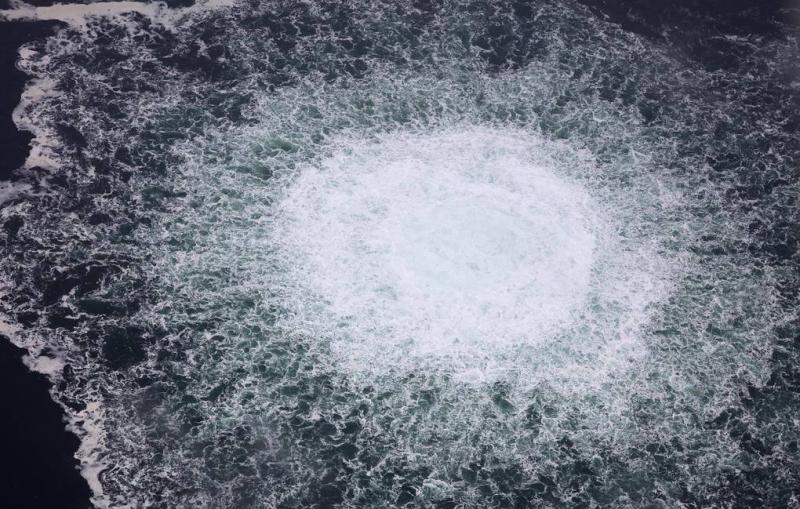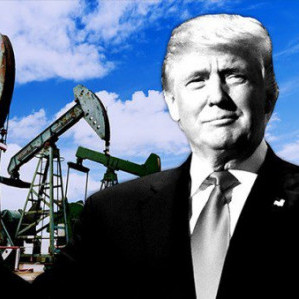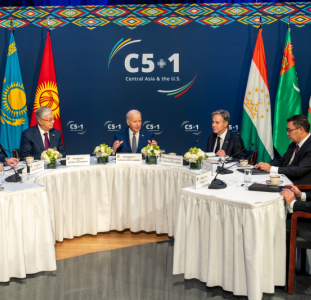
© EPA-EFE/SWEDISH COAST GUARD/TASS
Top stories from the Russian press on Friday, September 30th, prepared by TASS
Izvestia: Can a joint investigation into the Nord Stream incident be expected?
It is too early to speak about an international investigation into the accidents at the Nord Stream pipelines, Russia’s First Deputy Permanent Representative to the UN Dmitry Polyansky told Izvestia. Per Moscow’s request, the UN Security Council will hold a session on the gas pipeline ruptures on September 30 where, according to the diplomat, Russia is hoping to get its colleagues’ assessment of the events. Both the West and Russia concur that the gas leaks occurred as a result of sabotage and that these incidents need to be investigated. However, this process has not yet been launched and some countries have already begun to point fingers.
Gazprom would be interested in a probe since the accident hurts its commercial interests, says Director of the Center for European Information Nikolay Topornin, noting that the pipeline was insured and compensation is due following an assessment of the damages. "As for the investigation, there are a lot of international legal and technical subtleties. The gas pipelines are located in the territorial waters of certain countries, that is, in foreign jurisdictions. It will be difficult to get to the bottom of this without the involvement of technically equipped countries, such as the US and Russia, since satellite images and the monitoring of traffic near the site of the incident are needed," the expert explained, adding that under the current political conditions cooperation in this investigation seems unlikely.
As for the issue of restoring the pipelines, National Energy Security Fund expert Igor Yushkov thinks that it should be done by Gazprom or some other Russian company since foreign companies are not likely to get involved. According to him, repairing Nord Stream is theoretically possible yet might not be rational since "the Europeans are saying that they won’t use the pipelines and plan to reduce the purchases of Russian gas."
He noted that the accidents did not impact the supplies since Nord Stream 1 suspended deliveries in early September due to maintenance while Nord Stream 2 had never been launched. "Those are strategic risks for Europe," the expert says, noting that the pipelines served as a safety net in case of a cold winter or a gas deficit. Now, that safety net is gone.
Vedomosti: What’s next for the four new Russian regions?
Creating a new territorial ministry for the four regions that decided to join Russia is not in the works, various sources told Vedomosti. The issue of the system of administration of the new regions emerged after the Donetsk and Lugansk People’s Republics (DPR and LPR) as well as the Kherson and Zaporozhye Regions voted at the September 23-27 referendums in favor of joining Russia.
A source close to the presidential administration notes that a separate ministry is not yet needed since "the special military operation is underway on these territories," which means that it requires control on the part of the military. "Ministries are being created under calmer conditions," says political scientist Alexey Makarkin. In his opinion, during the transitional period, the new territories should be controlled by a newly created plenipotentiary representation with "direct access to the president" which will help swiftly resolve the many issues that are likely to emerge.
According to one of the sources close to the government, the idea of creating a separate agency was discussed in due course yet no decision was made on the matter.
Kommersant: New EU envoy kicks off his mission to Russia
The European Union’s ambassador to Moscow, French diplomat Roland Galharague has arrived in the Russian capital, replacing Germany’s Markus Ederer who left Russia in early September. His mission begins under highly complicated conditions since relations between Moscow and the EU have never been this tense.
Kommersant’s diplomatic sources close to EU structures told the newspaper that there weren’t many takers for this office since everyone understands that it involves working in a highly charged atmosphere with a limited staff due to mutual expulsions and a very restricted agenda. Amid the Ukrainian crisis, the European Union began to gradually fold political dialogue and consultations with Russia on various issues, ranging from the war on terrorism and drug trafficking to energy and climate. After the onset of Russia’s special military operation in Ukraine this work stopped altogether.
According to Kommersant’s sources in diplomatic circles, in general, Moscow’s attitude to Galharague is "even-handed." "He is a professional, speaks Russian and is French (which is important). We’ll see how he acts," one of the sources said.
"We will look at his deeds. He has good chances of maintaining dialogue on a diplomatic level. It is important for him to understand this and not to attempt to meddle in domestic affairs," another source noted.
Rossiyskaya Gazeta: Far East Development Minister weighs in on Northern Sea Route, cooperation with India
Russia began building up the Northern Sea Route as an alternative international transport and logistics corridor which now, under the US-led West’s sanctions and the departure of foreign transportation carriers, has taken on major geopolitical significance.
The annual volume of freight traffic over the Northern Sea Route has been confirmed by all companies, and by 2024 it will reach 90 mln tons, Russian Minister for Far East Development Alexey Chekunkov said in an interview with the newspaper. He also talked about renewable energy on Spitsbergen, record tourist inflows to the Kurils and highlighted cooperation with India.
He pointed out that the Arctic is of particular interest for the Global South since it depends on maritime trade in order to ensure food and merchandise supplies as well as export-import flows to that part of the world. The region has geostrategic significance for China, India, and the countries with major port hubs such as Singapore and the Persian Gulf states.
The official noted that given the current interest in pharma sector investments, cooperation with India has become particularly important. "India is a serious player on the pharmaceutical market and produces many off-patent medicines under its own brand names. Until 2022, a significant share of Russia’s pharmaceutical market was occupied by imported products while not all of them will continue to be imported. A serious niche is opening up for localizing this production. And an entire range of Indian companies, including [those interested in] setting up production in the Far East are already discussing projects with Russia," Chekunkov said.
Media: EU trucks may be barred from entering Russia
According to a decree signed by President Vladimir Putin, the government may prohibit the entry of trucks from unfriendly states to Russia.
"We’ve been waiting precisely for this decree for months now. We proposed not to completely ban the import of merchandise but to introduce restrictions on trucks entering Russia so that cargos are handed over at the border. European carriers will enter the border zone and hand over the cargos to our carriers," President of the Gruzavtotrans Association Vladimir Matyagin told Rossiyskaya Gazeta. According to him, this will help those Russian truckers who lost their jobs due to the sanctions to transport merchandise domestically.
Executive Director of BMJ Logistics Alexey Yakushev told Kommersant that back in April when the EU banned Russian and Belarusian transport carriers from crossing their borders, European logistics operators began preparing for retaliatory measures, actively wrapping up their activity in Russia. "So this ban will most likely affect small and medium-sized companies in the EU’s transport sector who continue to deliver cargos to Russia," he said, noting that domestic carriers would only win while those companies involved in imports from Europe would most likely shoulder additional expenses.









